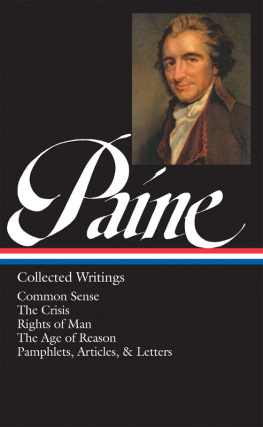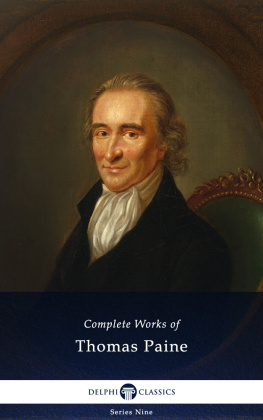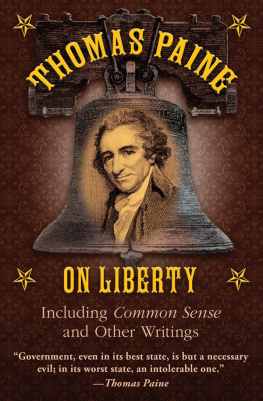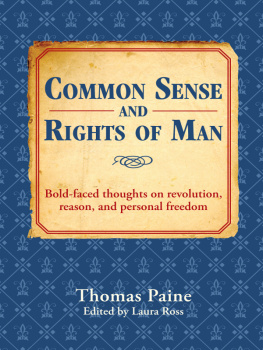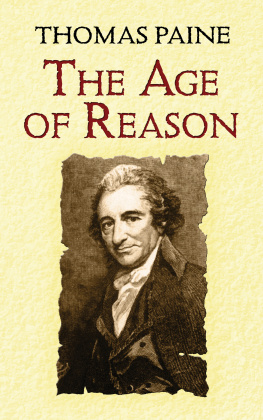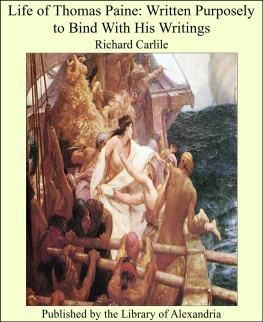Table of Contents
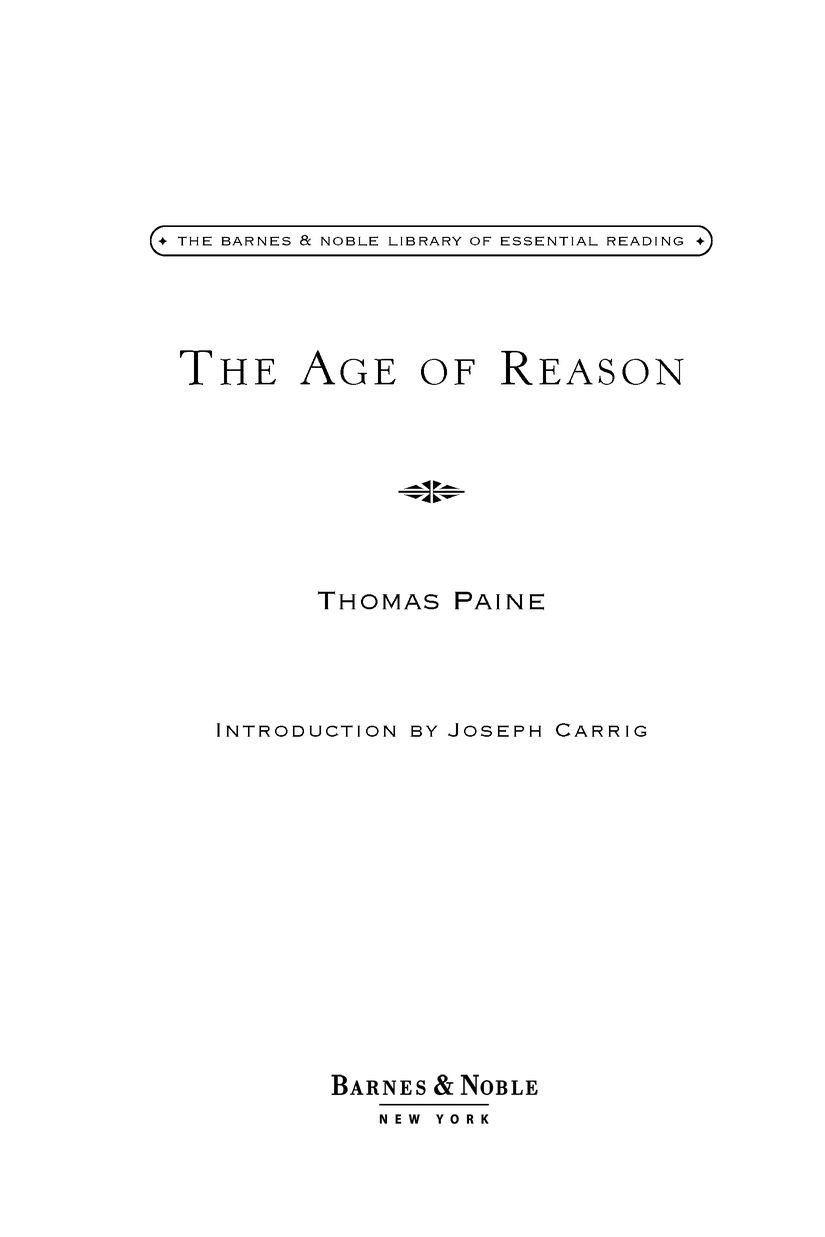
Introduction and Suggested Reading 2006 by Barnes & Noble, Inc.
Published in two parts: part 1 in Paris and New York in 1794; part 2 in New York in 1795
This 2006 edition published by Barnes & Noble, Inc.
All rights reserved. No part of this publication may be reproduced, stored in a retrieval system, or transmitted, in any form or by any means, electronic, mechanical, photocopying, recording, or otherwise, without prior written permission from the publisher.
ISBN-13: 978-0-7607-7895-1 ISBN-10: 0-7607-7895-7
eISBN : 978-1-411-42836-2
Printed and bound in the United States of America
3 5 7 9 10 8 6 4 2
TO MY FELLOW CITIZENS OF THE UNITED STATES OF AMERICA.
I PUT THE FOLLOWING WORK UNDER YOUR PROTECTION. It contains my opinion upon Religion. You will do me the justice to remember, that I have always strenuously supported the Right of every man to his opinion, however different that opinion might be to mine. He who denies to another this right, makes a slave of himself to his present opinion, because he precludes himself the right of changing it.
The most formidable weapon against errors of every kind is Reason. I have never used any other, and I trust I never shall.
Your affectionate friend and fellow citizen,
THOMAS PAINE.
LUXEMBOURG (PARIS), 8th Pluviose,
Second year of the French Republic, one and indivisible,
O. S. January 27, 1794.
INTRODUCTION
THE AGE OF REASON, BY THOMAS PAINE, IS AN uncompromising critique of organized religion and an impassioned plea to throw off the intellectual bondage of the church and embrace a new theology grounded in rational and scientific inquiry. Paine was one of the most influential thinkers of the American Enlightenment, and he played a key role in the American war for independence. The success of this revolution and the establishment of a limited government, based in the rule of law and committed to the protection of individual liberty and the rights of man, reflected the institutionalization of liberal political principles. According to Paine, this development marked the beginning of a rationalization of politics that eventually would be reproduced around the world. However, the horrifying events of the French Revolution, and of Robespierres Reign of Terror in particular, reminded Paine that political revolution is not an innocuous occurrence but has the potential to release forces that, if left unchecked, might result in the absolute self-destruction of society. He believed that it was vital that there be some counterforce to moderate the effects of revolution. Religion might provide such a counterforce, if it sufficiently conforms to the principles of human reason. But, as Paine argues in The Age of Reason, Christianity could never serve this purpose because it has no rational basis. What is necessary is a religious revolution, one that would reconceptualize the very nature of religion. The Age of Reason lays the groundwork for such a revolution. Paines primary object in writing this incendiary work was to call into question the conventional understanding of religion and to undermine the power of the Christian church. He believed that individual liberty requires the mind to be freed from its attachment to what he saw as the irrational beliefs inculcated by revealed religion. In The Age of Reason, Paine suggests that the properly free mind should instead be directed by opinions that emerge from a reasoned devotion to the true theology. Without this freedom, the liberty achieved in political revolution could never be complete. As provocative and controversial today as when Paine first wrote it, The Age of Reason demonstrates, in simple, candid, and compelling language, the irrationality of Christian doctrine; and it suggests, with equal directness, what is necessary to transform religion into a social force that has its foundation in reason.
Though less influential than some of his other works, The Age of Reason was arguably the most controversial of the many pamphlets that Thomas Paine published during his lifetime. More than twenty years earlier, Paine had written a short pamphlet called The Case of the Officers of Excise, which advocated raising the salaries of British excise officers as a barrier to corruption. This pamphlet ultimately led to his dismissal from the excise service. His most famous pamphlet, Common Sense, written shortly before the adoption of the Declaration of Independence, advocated the creation of an independent American republic at a time when it was quite dangerous to make such suggestions publicly. And Rights of Man, written in 1791 and 1792, defended the principles of the French Revolution and called for the overthrow of the British monarchy. Its publication resulted in the establishment of laws in Britain banning the pamphlet and prohibiting its sale; British loyalists hanged and burned Paine in effigy; and eventually he was convicted in absentia for seditious libel. In spite of these reactions to his earlier writings, however, the effect of The Age of Reason was more severe and more personal. The pamphlet was generally regarded as a support of atheism, and Paine himself an atheist and infidel. Printers who tried to sell the pamphlet were condemned for blasphemy. But, more significantly to Paine, he lost many of his friends (including Samuel Adams and Benjamin Rush); his request to be buried in a Quaker cemetery was refused; and he suffered a damaged reputation following his death to the point that, well into the nineteenth century, he was unjustly excluded from the ranks of those considered to be among the major leaders of the American Revolution.
As might be gathered even from this brief account, Paine did little to avoid confrontation. However, it is unlikely that he acquired this taste for controversy from his parents. He was born on January 29, 1737, in Thetford, England. His mother was a practicing Anglican and his father a Quaker. As a boy, Paine frequently attended Quaker meetings with his father, and this exposure had a lasting influence on him. Later in life, even as he was writing The Age of Reason in condemnation of organized religion, he remained sympathetic to the Quakers and characterized Quakerism as the religion that approaches most closely the true, rational religion. This is not to suggest that, in his youth, Paine had a particularly strong interest in questions of religion. He was drawn rather to the study of history, mathematics, and science; and it was these interests that ultimately had the greatest influence on his thinking.
It was many years, however, before Paine began to articulate his thoughts in writing. He spent almost the whole of his first forty years in England, seemingly without any consistent direction to his life. At thirteen years of age, he became an apprentice to his father as a corset maker. Eventually, he established himself as a master corset maker and remained in this profession, off and on, for many years. Somewhat later, he studied for the excise service, and in 1764 was appointed as a permanent excise officer, only to be dismissed a year later on minor corruption charges. He returned to corset making for a short period, gave that up again, and moved to London to become a teacher. In 1768, he was reappointed as an excise officer; however, by 1774, he had been dismissed again, this time in response to his pamphlet petitioning Parliament for higher salaries.




